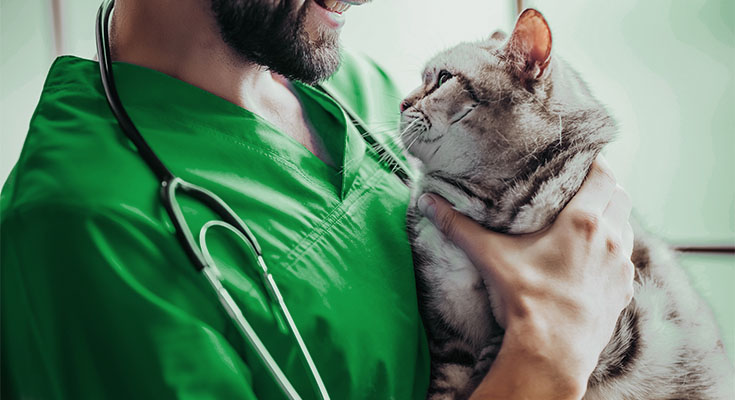We all want the best for our pets and to keep them as healthy as possible. Without vaccinations, your pet may be more susceptible to illnesses and disease.
This guide will take you through what vaccines your dog or cat will need, when they need them, and how much they cost.

Dog vaccinations
Vaccinating your dog against common illnesses is important for their ongoing health, and is something your vet can advise on.
What vaccinations does my dog need?
The primary course for puppies is most commonly two vaccines, two to four weeks apart. Sometimes the second vaccine is broken into two parts.
Dogs are routinely vaccinated against:
- Distemper – this often fatal disease is common in areas with unvaccinated dogs
- Hepatitis – this disease affects dog’s livers and can make them severely unwell
- Parvovirus – this disease causes dogs to vomit and have diarrhoea. It can be deadly if left untreated, especially for puppies
- Leptospira – this often fatal disease can cause kidney and liver damage. It can pass from dogs to humans too, so vaccinating your dog can also protect you
There are also two optional vaccines:
- Kennel Cough - this vaccine is sometimes a requirement for dog kennels or boarding. Your dog can receive this vaccine from the age of 12 weeks
- Rabies - this is compulsory for dogs that travel abroad, but otherwise isn't usually offered
What is the cost of dog vaccinations?
On average, your pet’s vaccinations should cost between £40 and £70. The cost can vary depending on your vet and the breed of your dog.
It may also be worth checking with your vet to see if they offer a vaccination plan. This may allow you to pay a one-off, upfront fee that covers all vaccines for the rest of your pet's life.
Top tip: Vaccinations are not covered on any of our MORE THAN pet insurance policies, and other pet insurers also may not cover them. It’s worth budgeting for these costs ahead of time.
What is the dog vaccine schedule?
Our in-house vets recommend regular vaccine boosters. They play a leading role in protecting your furry companions against many infectious and fatal diseases.
It's worth noting that if your dog requires treatment for Distemper, Hepatitis, Parvovirus or Leptospira (DHPL) and they are not vaccinated against them, you won't be covered under a MORE THAN pet insurance policy. Other pet insurers also may not cover these costs.
Puppy vaccines
One of the common schedules for your puppy's vaccines is receiving their vaccine for DHPL in two stages. If your puppy is eight to ten weeks old, they will receive their first vaccination, followed by the second vaccination four weeks later. If your puppy is older than 10 weeks at the first vaccination, they will have their second after two weeks.
Annual boosters
For every year older your dog becomes, they will be offered their annual booster, as well as the optional Kennel Cough vaccine.
Boosters need to be given by your vet every 12 months, and they will be able to advise what level of protection each one gives your dog.
How long after the vaccine can dogs go out?
When you bring a new puppy home, we're sure you want them to get out and about exploring as soon as possible.
If your dog hasn't yet received any vaccinations, they may not be able to explore at ground level. Carrying them is usually the best way to explore your local area and socialise them, while keeping them safe.
Bodies of water and mud can house harmful bacteria, so be sure to avoid these areas until you’ve been given the go ahead by your vet.
Our in-house vet, Luke, says: "The standard is to allow 2 weeks from your pet's second vaccination before they start exploring outdoors. This allows sufficient time for antibodies to be produced and provide protection".
Cat vaccinations
Vaccinating your cat against common illnesses is important for their ongoing health, and is something your vet can advise on.
What vaccinations does my cat need?
The most common vaccines help to protect your cat against these diseases:
- Cat flu – this covers respiratory tract infections, including feline herpes virus and calicivirus, which can cause ulcers, congestion, sneezing and inflamed gums
- Infectious enteritis - feline parvovirus which is highly contagious and can cause high fever, vomiting, diarrhoea, and severe hydration
- Leukaemia virus – this can weaken a cat’s immune system and cause enlarged lymph nodes, bladder, skin or respiratory infections, weight loss and fever
How much are cat vaccinations?
As with dog vaccines, cat vaccinations should cost between £40 and £70, but your vet will be able to advise.
Your vets may offer a payment plan where vaccines are included for your pet’s lifetime. And just like dog vaccines, they are not covered on any MORE THAN pet insurance policies. Other pet insurers also may not cover these costs, so it’s worth budgeting for these ahead of time.
What is the cat vaccination schedule?
Kitten vaccines
When your cat is still a young kitten, they should receive their first and second doses of vaccine. This will protect them against cat flu, enteritis and leukaemia.
Annual boosters
For every year older your cat becomes, they will be offered a booster vaccine. The vaccine can vary depending on the lifestyle of your cat (indoor or outdoor). Your vet will be able to best advise the best vaccine for your cat.
If your cat requires treatment for Feline Leukaemia, Cat Flu or Infectious Enteritis and they are not vaccinated against them, you would not be covered for treatment costs on any of our MORE THAN pet insurance policies. Other pet insurers also may not cover these costs.
Do indoor cats need vaccinations?
It’s usually recommended that even indoor cats should be vaccinated, especially against cat flu and enteritis.
It’s always best to check with your vet if you have an indoor cat, and they can best advise what vaccinations are recommended based on your cat’s lifestyle.
Protecting your pet
Having pet insurance in place for your four-legged companion can help when it comes to protecting them from the unexpected. At MORE THAN, we have four different levels of cover to suit your needs.



